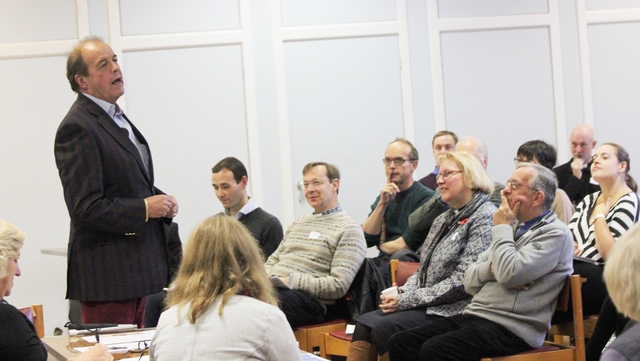
PRESIDENTIAL ADDRESS
Bishop Christopher referred to changes that had happened since the previous meeting, including a £929k grant from the Church Commissioners, which has helped pay for the creation of Harbour Church and a network of pioneer ministers, and the three-day course in Leading Your Church Into Growth.
He also spoke about national changes such as the EU referendum vote, the change of prime minister and conflict in various parts of the world. He described the swings in human history between an ‘I’ worldview and a ‘we’ worldview, and explained that either extreme was damaging. He explained that the desire to enlarge congregations was to provide more disciples of Christ who are willing and able to transform our communities and nation. For the full speech, click here.
RENEWAL AND REFORM
John Spence, Archbishops’ Council member and chair of its finance committee, spoke to synod about the national C of E’s Renewal and Reform agenda, speaking with reference to the synod's papers on Renewal and Reform. He explained the challenges faced by the C of E in terms of the steady 1% decline in attendance each year, and the fact that there are parts of the C of E where no one on the electoral roll is under 70. He described how research had identified what could make a difference to the Church’s historical decline, and how action to address this had crystalised into its Renewal and Reform agenda.
This includes a number of different ‘workstreams’, looking at areas such as how dioceses were resourced from the central C of E; how we resource ministerial education; how we inspire lay leaders; how we create and develop the leaders of the future; and how we develop our church schools. The overall aim was to marshall the resources and talents of the whole Church to help and resource dioceses to achieve their goals.
He also specifically addressed the issue of finance. In 2011, 45 per cent of voluntary parish share paid to each diocese’s central pot came from those over 65. And the ‘golden generation’ of those paid pensions based on their final salaries is starting to die out. So the gap between what dioceses ask for and what they receive may grow bigger – albeit Portsmouth’s collection of parish share payments is an impressive 98%. It will be important for dioceses to retain tight financial discipline. Although the Church Commissioners has historic investments of £7bn, these are tightly locked away to ensure the income is available for future generations.
He finished by describing his personal circumstances, including how he lost his sight in his 30s. He said he didn’t need eyesight to have a vision for the Church – which was for people to work together to unlock the gifts that other people can bring. He said it is up to us as individual Christians, not our bishops or clerics, to do this. His vision was to restore the risen Christ to the centre of this country and its culture again.
SAFEGUARDING
Much had changed since Diocesan Synod was last updated on safeguarding issues. That included changes in national policies, audits of diocesan safeguarding procedures, and a new national C of E safeguarding team.
Portsmouth diocese had a good record, and the audit of our safeguarding procedures revealed strengths in our training and information programme, our responses to allegations and a robust safeguarding panel.
Synod members approved the motion to fully implement national safeguarding policies.
PARSONAGES
Two years ago, our Bishop’s Council allocated £600k from reserves to spend on improvements to our housing stock, which it was felt had been historically under-funded.
Property manager Chris Pride gave synod members an update on how that money was being spent - £200k each year for three years – and the process of deciding how to prioritise potential improvements. He showed photos of parsonages that had been improved and shared feedback from clergy families who were thankful for improvements to their kitchens, bathrooms and roofs.
DIOCESAN BUDGET 2017
Director of finance Malcolm Trigger-Ross presented the 2017 budget for approval by synod, referring to the 2016-10 Synod Budget Paper. He . He explained that the total of parish share to be collected was due to rise in line with the forecast for CPI inflation, by 1.9%. That was influenced by a 1.5% rise in clergy stipends in April 2017, and a lower vacancy rate (12.8%) than recently. More details are here.
said the overall financial position of our parishes is actually one of improving finances, growing reserves and reducing parish share (as a percentage of income).
The major changes from the 2016 budget to the 2017 one include more spending on a Diocesan Director of Vocations and Ordinands, additional curates, parsonages, strategic development, increases in payment to the national Church and increases in stipends. The funding for those increase would come from a wider range of sources than usual – including money from the Church Commissioners’ grant, savings and additional income, and from reserves, as well as parish share.
Synod members voted to approve the budget for 2017, including asking parishes for £4.9m in parish share.
DEANERY SYNOD ELECTIONS
Synod members approved a formula to elect lay representatives of deanery synods in 2017, including a specific scheme relating to Harbour Church, which was not a parish as per the papers below:
Proposed Formula for Deanery Elections recommended to Diocesan Synod for adoption
Scheme to enable Deanery Synod Representation for Harbour Church